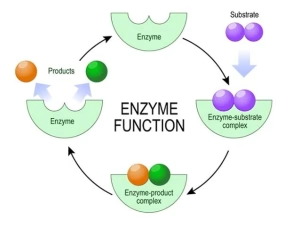
Enzymes: Importance, Definition & Characteristics
Before diving into the main content, we will discuss enzymes and simplify the content so you can gain a good understanding of enzymes.
What are Enzymes?
Enzymes are proteinaceous in nature; they are primarily proteins responsible for speeding up the rates of metabolism. In other words, enzymes accelerate metabolic reactions in the body, which remain unused until the reactions are completed. Enzymes are also known as biochemical catalysts, responsible for various reactions in our bodies. Let’s move on to the characteristics of enzymes.

Characteristics of Enzymes
- They are proteins (proteinaceous).
- Enzymes are responsible for speeding up reactions, which remain unused until the reactions are completed.
- They are easily affected by heat.
- The pH level is influenced by the activity of enzymes.
- Enzymes are typically specific to one reaction rather than many.
- A small amount of enzyme can act on a large amount of substrate.
- The range of temperature determines their state of reaction, as they act within a narrow temperature range.
Importance of Enzymes
Enzymes play a crucial role in digestion. They are responsible for breaking down or converting complex, insoluble food molecules into simple food molecules, such as glucose. These molecules are then absorbed from the intestine back into the body, where they are used to produce energy (ATP), support growth, and facilitate other functions. Without enzymes, chemical digestion would not be possible, and animals would not be able to obtain nutrients from the complex food substances they eat. In other words, digestion would not be possible.







